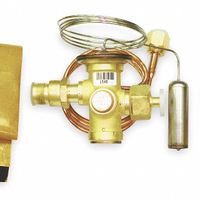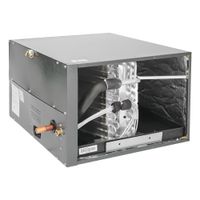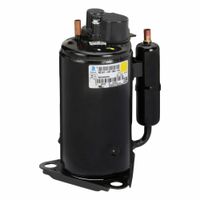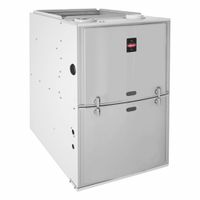Call +(254) 703 030 000 / 751 483 999 / 721 704 777
- Home
- Hvac And Refrigeration
- Central Equipment
.....Read More
Frequently Asked Questions
What is the average lifespan of a central heating and cooling system?
The average lifespan of a central heating and cooling system, often referred to as an HVAC (Heating, Ventilation, and Air Conditioning) system, typically ranges from 15 to 20 years. However, several factors can influence this lifespan, including the quality of the installation, the frequency and quality of maintenance, the climate, and the intensity of use.
Regular maintenance is paramount in extending the life of your HVAC system. This includes annual professional tune-ups, changing air filters regularly, and keeping the outdoor unit free of debris. A well-maintained system operates more efficiently, experiences less wear and tear, and is less prone to unexpected breakdowns.
The climate also plays a significant role. Systems in regions with extreme temperatures, requiring more frequent and intensive operation, may experience a shorter lifespan compared to those in milder climates. Similarly, the quality of the initial installation is crucial; a poorly installed system can lead to premature failure and inefficient operation.
While 15-20 years is a general guideline, some well-maintained systems can last longer, while others, due to neglect or poor installation, may fail sooner. When a system approaches this age range, it's often more cost-effective to consider replacement due to declining efficiency and increasing repair costs.
How often should I service my HVAC system?
Typically, HVAC systems should be serviced at least once a year, preferably in the spring before the cooling season and in the fall before the heating season. Regular maintenance helps ensure the system runs efficiently, extends its lifespan, and can prevent unexpected breakdowns. This routine service usually includes checking refrigerant levels, cleaning coils, inspecting electrical components, and lubricating moving parts. If you have an older system, live in a climate with extreme temperatures, or have allergies, more frequent servicing might be beneficial.
What are the signs that my HVAC system needs repair?
Some common signs that your HVAC system needs repair include: * **Unusual Noises:** Squealing, grinding, banging, or rattling noises coming from your HVAC unit often indicate a problem with a motor, fan, or other internal components.
* **Reduced Airflow:** If you notice weak airflow from your vents, it could be due to a clogged air filter, issues with the fan motor, or ductwork problems.
* **Inconsistent Temperatures:** Uneven heating or cooling throughout your home suggests that your system is not distributing air effectively or that there's a problem with the thermostat or a specific component.
* **Increased Energy Bills:** A sudden or gradual increase in your energy bills without a corresponding change in usage often points to an inefficient HVAC system that is struggling to maintain desired temperatures.
* **Strange Odors:** Burning smells, musty odors, or a smell like rotten eggs coming from your vents can indicate electrical issues, mold growth, or a gas leak, respectively.
* **Frequent Cycling:** If your HVAC system turns on and off more frequently than usual, it could be a sign of an oversized unit, a faulty thermostat, or a refrigerant leak.
* **Leaking Water:** Puddles or drips around your indoor or outdoor unit may indicate a clogged condensate drain line, a refrigerant leak, or a damaged coil.
* **No Heating or Cooling:** This is the most obvious sign. If your system is not producing any heat or cool air, it's time to call a professional.
How can I improve the efficiency of my central heating and cooling system?
To improve the efficiency of your central heating and cooling system, consider these steps:
Regular Maintenance: Schedule annual professional tune-ups for your HVAC system. Technicians can clean coils, check refrigerant levels, inspect electrical connections, and lubricate moving parts, all of which contribute to better efficiency and prevent costly breakdowns.
Air Filter Replacement: Replace or clean air filters monthly, or more frequently if you have pets or allergies. A clogged filter restricts airflow, making your system work harder and consume more energy.
Thermostat Management: Install a programmable or smart thermostat to optimize temperature settings based on your schedule. Set higher temperatures in summer and lower in winter when you're away or asleep.
Seal Ductwork: Leaky ducts can lose a significant amount of conditioned air before it reaches its destination. Have your ductwork inspected and sealed by a professional to prevent this energy waste.
Insulation and Weatherstripping: Ensure your home is well-insulated, especially in the attic and walls. Seal cracks and gaps around windows and doors with weatherstripping and caulk to prevent drafts and maintain stable indoor temperatures.
Clear Vents and Registers: Make sure furniture, curtains, or rugs aren't blocking supply and return vents. Obstructions hinder proper airflow, reducing the system's effectiveness.
Consider Upgrades: If your system is old (over 10-15 years), consider upgrading to a more energy-efficient model with a higher SEER (Seasonal Energy Efficiency Ratio) for cooling and AFUE (Annual Fuel Utilization Efficiency) for heating.
By implementing these measures, you can significantly reduce your energy consumption, lower utility bills, and extend the lifespan of your central heating and cooling system.
What size HVAC system do I need for my home?
The size of the HVAC system you need for your home depends on several factors, including the square footage of your house, your local climate, the insulation levels, and the number and type of windows. A system that is too small won't effectively heat or cool your home, while one that is too large will cycle on and off too frequently, leading to inefficient operation, higher energy bills, and reduced equipment lifespan.
To determine the appropriate size, a professional HVAC technician typically performs a "load calculation." This involves assessing your home's unique characteristics to determine its heating and cooling needs. They consider factors like heat gain from sunlight, heat loss through walls and windows, the number of occupants, and the heat generated by appliances.
It's crucial to have a professional perform this calculation rather than relying on rough estimates based solely on square footage. An accurately sized HVAC system will provide optimal comfort, energy efficiency, and longevity.
How much does it cost to replace a central air conditioning unit?
The cost to replace a central air conditioning unit can vary significantly based on several factors, typically ranging from $3,800 to $7,500. Key elements influencing the price include the unit's size (BTUs), energy efficiency (SEER rating), brand, and the complexity of the installation. For example, a higher SEER rating unit might cost more upfront but save on energy bills over time. Additional costs can arise from ductwork modifications, electrical upgrades, or the removal of old equipment. Labor costs also play a role, varying by region and the specific HVAC contractor. It's recommended to get multiple quotes from licensed professionals to ensure a competitive and accurate estimate tailored to your home's specific needs.
What is the difference between a heat pump and a furnace?
A furnace generates heat by burning fuel (like natural gas, propane, or oil) or using electricity, then distributes that heat through ductwork. It's primarily a heating system. A heat pump, on the other hand, doesn't generate heat directly. Instead, it moves heat from one place to another. In colder months, it extracts heat from the outside air (even cold air contains some heat) and transfers it indoors. In warmer months, it reverses the process, extracting heat from inside your home and moving it outside, effectively acting as an air conditioner. Heat pumps are generally more energy-efficient for heating in moderate climates because they transfer heat rather than generate it, consuming less energy. Furnaces are typically more effective in very cold climates where heat pumps might struggle to extract sufficient heat from extremely cold air.
How do I know if my ductwork needs to be replaced?
Ductwork, an essential component of your HVAC system, plays a crucial role in maintaining comfortable indoor temperatures. Over time, however, ductwork can deteriorate, leading to inefficiencies and higher energy bills.
Several signs indicate your ductwork might need replacement. A common indicator is uneven heating or cooling throughout your home, suggesting leaks or blockages in the system. Visible signs of damage, such as rust, kinks, or tears, are also clear indicators. Another red flag is a sudden increase in your energy bills without a corresponding change in usage, as damaged ducts can lead to significant energy loss. Excessive dust accumulation in your home, despite regular cleaning, could also point to leaky ductwork drawing in contaminants from unconditioned spaces. Finally, if your ductwork is older, especially more than 15-20 years old, it might be made of less efficient materials or have deteriorated from wear and tear, making replacement a more cost-effective solution in the long run.
What are the benefits of upgrading to a high-efficiency HVAC system?
Upgrading to a high-efficiency HVAC system offers numerous benefits. Firstly, you'll experience significant energy savings. These systems are designed to use less energy to heat and cool your home, leading to lower utility bills. Secondly, they provide improved comfort. High-efficiency units often have more precise temperature control and better humidity management, creating a more consistent and comfortable indoor environment. Thirdly, the environmental impact is reduced due to lower energy consumption, which translates to a smaller carbon footprint. Fourthly, these systems can increase your home's value, making it more attractive to potential buyers. Finally, newer, more efficient HVAC systems tend to be more reliable and may come with longer warranties, reducing maintenance costs and providing peace of mind.
How can I reduce the noise from my central air conditioner?
To reduce noise from your central air conditioner, start by checking the outdoor unit. Ensure it's level, as an uneven base can cause vibrations. Tighten any loose panels or screws. Clean the coils and remove any debris that might be obstructing airflow or causing rattling. Lubricate the fan motor if it's squeaking.
Indoors, inspect your ductwork for leaks or loose connections, which can create whistling or rushing sounds. Ensure all registers and vents are clear and not blocked by furniture. Consider adding insulation around the ducts to muffle sound. If the noise persists, it could indicate a more serious issue like a failing compressor or fan motor, which would require professional attention. Regular maintenance, including professional tune-ups, can help prevent many noise-related problems.




